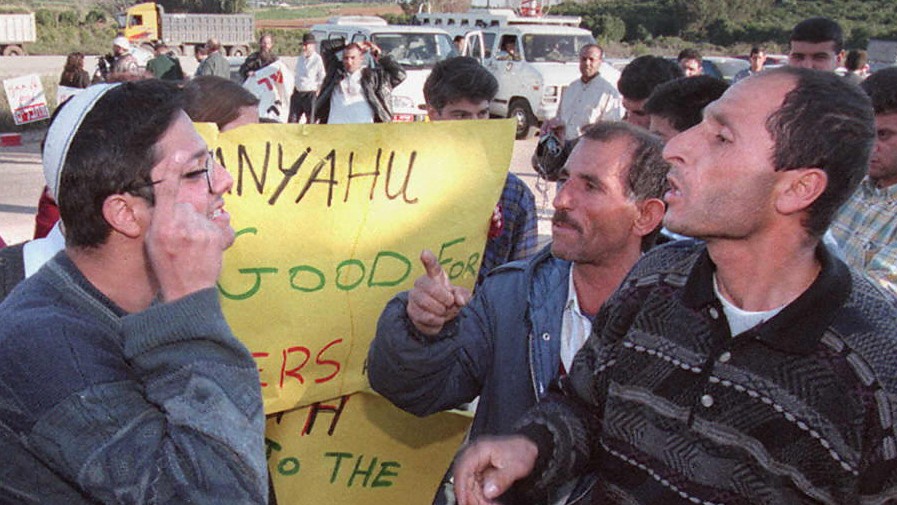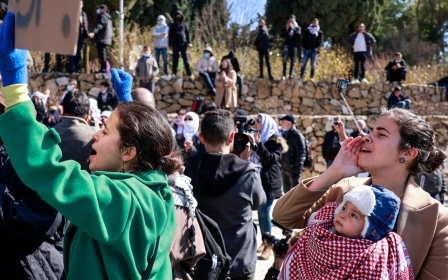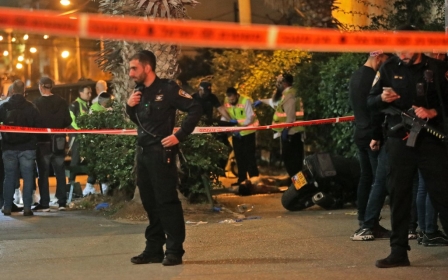How Israel's Ben-Gvir has exploited attacks to fan violence and build his brand
Days after the three deadly gun attacks in Israel last month, Haaretz newspaper published a political cartoon: it shows a long-bearded zealot walking into the office of lawmaker Itamar Ben-Gvir announcing: "Another attack!"
Ben-Gvir, seated behind his desk, smiles with satisfaction and responds: "I'm so spoiled."
A big portrait of Rabbi Meir Kahane, an anti-Palestinian extremist and founder of the outlawed Kach party, decorates the wall behind him.
Ben-Gvir is the leader of a small opposition party in Israel's parliament, or Knesset. In such a short period, he has become one of the most vocal and prominent members of parliament, especially during times of heightened tensions and indictment against Palestinians.
His party is called "Jewish Power", but the Jewish power of its toxic and ultra-nationalist racist leader is not the real issue; the real issue is the weakness of the left-centre political forces within Israel that allow the normalisation and legitimisation of this once unilaterally condemned agent provocateur.
One step down the lane of recent history, the issue began with Benjamin Netanyahu.
The former prime minister single-handedly paved the way for Ben-Gvir to enter the Knesset when he desperately needed extra parliamentary seats in the last round of the 2021 elections.
He united Ben-Gvir with the Religious Zionism faction led by the far-right figure Bezalel Smotrich to secure his victory.
The rest is history, or rather the future. Netanyahu lost, and Ben-Gvir - the Israeli supremacist and anti-Palestinian hater - won.
He has thus become Netanyahu's long-lasting legacy and the indication of a changing political reality in Israel.
'Darling of Israeli media'
A Jewish supremacist who lives in an illegal settlement in the occupied West Bank, Ben-Gvir claims he has changed. He has not.
The political and media landscape, as well as the Israeli public, who now accept him, are the ones who changed. What was once inconceivable today is the reality, and probably the indisputable future.
If you need proof, here it is: Ben-Gvir, an MP from a tiny opposition party, was given 100 hours of screen time on public broadcasting in 2021 alone, a figure some senior ministers of the cabinet can only dream of.
"Ben-Gvir has become the darling of Israeli media," Zehava Galon, the former head of left-wing party Meretz, told Middle East Eye.
"He brings them ratings by spreading racist ideas. Media forms public consciousness and thus sends a message that Ben-Gvir is a role model to follow."
'He brings them ratings by spreading racist ideas. Media forms public consciousness and thus sends a message that Ben-Gvir is a role model to follow'
- Zehava Galon, Israeli politician
If you are looking for a simple demonstration of the profound change in Israeli political and social climate, take a look back in history and compare.
Rabbi Meir Kahane, an outspoken proud racist supremacist and the ideological father-figure of young Ben-Gvir, won seats in parliament in the 1984 elections leading his Kach party.
Whenever he took the podium, right-wing Likud party MPs used to leave the plenum of the Knesset. The media completely ignored him.
In 1988, he was banned from participating in the elections for his racist views, and six years later his party was outlawed as a terrorist organisation.
Kahane was treated by officials like a pariah aside from a small group of his dedicated followers.
In contrast, Ben-Gvir, his former disciple, is now more than welcome, warmly embraced by the establishment of the new, emerging Israel. He is just a symptom; the infected public sphere is the disease.
Friend of the Lehava group
Ben-Gvir is a smart player, capable of catching the winds of change and making adjustments to give him advantage when necessary.
"Itamar is this new generation," Nati Smadar of the far-right advocacy group Lehava, whose members have been convicted of an arson attack on a mixed Palestinian-Jewish school, told the Washington Post last year.
"The way to participate in public discourse is to talk positively - not about hating Arabs, but loving the Jewish nation, though the core ideology is the same," Smadar added, describing Ben-Gvir's strategy.
She knows what she's talking about. Ben-Gvir, after all, is buddies with the racist heads of the Lehava group.
Lehava, which means "flame" in Hebrew, is the acronym for "Prevention of Assimilation in the Holy Land". The group's primary goal is preventing "Jewish assimilation" and relationships between Jews and non-Jews, be they Palestinian, Muslim, Christian or other.
In a 2016 interview with Ynet news website, Ben-Gvir called for Bentzi Gopstein, leader of the Lehava group, to be awarded the Israel Prize, the highest honour offered by the state, since he "teaches the youngsters love of their homeland and the army".
"I have the honour to be invited to lecture in the camps he organises," Ben-Gvir said.
In 2019, Gopstein was indicted on charges of incitement to terrorism and racism. Ben-Gvir served as his attorney.
Changing tactics
The notorious reputation Ben-Gvir built from a young age has landed him in a few uncomfortable situations. Mainly his lack of military service, a sensitive topic for him.
When he turned 18, the age of recruitment, Ben-Gvir's application to join the army was denied as the military did not want to deal with him. Now a member of the parliament's foreign affairs and defence committee, Ben-Gvir is often confronted with this fact by politicians and the media.
His response is a rather surprising Ben-Gvir-like explanation: it's not the army that did not want him; it's the radical left who convinced former defence minister Ehud Barak not to let a "Kahanist" like him in.
Ben-Gvir, now 45, has indeed come a long way since those days. From a hooligan active in wild far-right demonstrations in Jerusalem, he is now a lawyer, father of five, and a settler in Hebron in the occupied West Bank, defending mainly Israeli settlers accused of violence against Palestinians.
In between, he has accumulated a long list of indictments for various forms of incitement and almost the same number of acquittals.
He had his first moment of nationwide glory shortly before the assassination of former prime minister Yitzhak Rabin in 1995 when he appeared on television proudly presenting the brass Cadillac emblem stolen from Rabin's car and announcing: "We got to his car, we'll get to him too."
In all recent interviews, he says he would not have done it today. After all, prior to the parliamentary election, he also removed from his living room wall the picture of his idol, Baruch Goldstein, the settler from Kiryat Arba who in 1994 murdered 29 Palestinian Muslim worshippers in Hebron's Ibrahimi Mosque and wounded 125 more.
So who is the new improved Ben-Gvir? Basically the same, only more savvy and sophisticated. He only changed tactics.
Fanning hate and violence
The new Ben-Gvir does not apologise anymore, just threatens legal actions against all who dare to remind him "inaccurately" of his past behaviour. Every threat equals another headline.
Here is the short list of those:
-
"Itamar Ben-Gvir suing Facebook for 'deliberately harming his exposure for political reasons'";
-
"MK Ben-Gvir suing radical leftists; 'he who slanders me - will pay'";
-
"Ben-Gvir sues Naftali Bennett's wife who referred to 'Jewish Power' members as terrorists";
-
"Ben-Gvir says he'll sue Knesset speaker for removing him after yelling 'terrorist'".
The list goes on. The method is self-evident: to spread fear and silence all criticism. This is just a background for things to come.
The real question is if and how dangerous Ben-Gvir really is. It does not take ardent leftists to believe he is, and very much so.
Referring to the riots that erupted across Israel last May, police commissioner Kobi Shabtai put it bluntly: "The person who is responsible for this Intifada is Itamar Ben-Gvir." Shabtai also blamed him for far-right demonstrations around Jerusalem's Old City, which fueled tensions at the time.
At the height of the Sheikh Jarrah solidarity campaign last year, Ben-Gvir set up a parliamentary office in the neighbourhood. Netanyahu's office warned him at the time of Gaza rockets if he didn't leave East Jerusalem.
Besides spreading fear, there are other concerns to worry about, Galon, now head of Zulat NGO for equality and human rights, told MEE.
"Ben-Gvir is not only an imminent danger to Israeli democracy, but also a real danger in the long run," said Galon.
"The young generation grows on his ideology and conduct of hate, racism and Jewish supremacy. This prospect endangers Israel's position in the family of countries where democracy and equal rights to all citizens prevail".
The current political and security climate provides fertile ground for Ben-Gvir's growth. He is untouchable on the far-right and unaffected by the center-left, who are locked in a "not Bibi (Netanyahu)" government and paralysed by fear to rock the boat and drown it.
Ben-Gvir's promising future may simultaneously be the end of the shrinking left, and as a free agent, he will continue to do what he does best - fan hate and violence.
Middle East Eye delivers independent and unrivalled coverage and analysis of the Middle East, North Africa and beyond. To learn more about republishing this content and the associated fees, please fill out this form. More about MEE can be found here.







